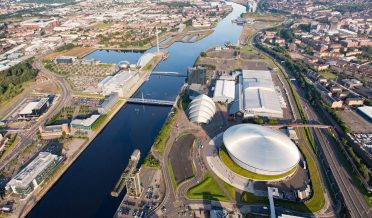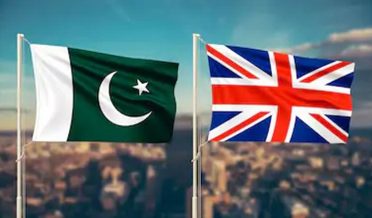Report/
Shahid Iqbal Kharal
In November, the UK, together with the partners Italy UK will host an event many believe to be the world’s best last chance to get runaway climate change under control.
For nearly three decades the UN has been bringing together almost every country on earth for global climate summits – called COPs – which stands for ‘Conference of the Parties’. In that time climate change has gone from being a fringe issue to a global priority.
This year will be the 26th annual summit – giving it the name COP26. With the UK as President, COP26 takes place in Glasgow. In the run up to COP26 the UK is working with every nation to reach agreement on how to tackle climate change. World leaders will arrive in Scotland, alongside tens of thousands of negotiators, government representatives, businesses, and citizens for twelve days of talks. Not only is it a huge task but it is also not just yet another international summit. Most experts believe COP26 has a unique urgency.
For the first time ever, something momentous happened: every country agreed to work together to limit global warming to well below 2 degrees and aim for 1.5 degrees, to adapt to the impacts of a changing climate and to make money available to deliver on these aims.

The Paris Agreement was born. The commitment to aim for 1.5 degrees is important because every fraction of a degree of warming will result in the loss of many more lives lost and livelihoods damaged. Under the Paris Agreement, countries committed to bring forward national plans setting out how much they would reduce their emissions – known as Nationally Determined Contributions, or ‘NDCs’. They agreed that every five years they would come back with an updated plan that would reflect their highest possible ambition at that time. Glasgow is the moment for countries to update their plans. The run up to this year’s summit in Glasgow is the moment (delayed by a year due to the pandemic) when countries update their plans for reducing emissions.
But that’s not all. The commitments laid out in Paris did not come close to limiting global warming to 1.5 degrees, and the window for achieving this is closing. So as momentous as Paris was, countries must go much further than they did even at that historic summit to keep the hope of holding temperature rises to 1.5 alive. COP26 needs to be decisive.
We’d like to know what message you would want to send to concentrate the minds of world leaders at the conference in Glasgow from 31 October until 12 November. The Scottish Event Campus will be one of the host venues for the upcoming COP 26 climate summit in November. It’s a huge moment for the global struggle with the climate emergency, and yet already concerns are mounting that COP 26 might fall short of the commitments we need to constrain global heating.

With this in mind, we would like to give our readers an opportunity to send a message to the powerful leaders who will decide whether the conference is a success or failure.
You can read up on some of the latest issues here. And then tell us: what message would you want to send to concentrate the minds of world leaders at this crucial juncture? Please keep it succinct and if possible home in on a specific but powerful request. You can get in touch by filling in the form below. Your responses are secure as the form is encrypted and only the Guardian has access to your contributions.
The United Nations Climate Change Conferences are yearly conferences held in the framework of the United Nations Framework Convention on Climate Change (UNFCCC). They serve as the formal meeting of the UNFCCC Parties (Conference of the Parties, COP) to assess progress in dealing with climate change, and beginning in the mid-1990s, to negotiate the Kyoto Protocol to establish legally binding obligations for developed countries to reduce their greenhouse gas emissions. From 2005 the Conferences have also served as the “Conference of the Parties Serving as the Meeting of Parties to the Kyoto Protocol” (CMP);[2] also parties to the Convention that are not parties to the Protocol can participate in Protocol-related meetings as observers. From 2011 the meetings have also been used to negotiate the Paris Agreement as part of the Durban platform activities until its conclusion in 2015, which created a general path towards climate action. The first UN Climate Change Conference was held in 1995 in Berlin.
Environmental conference history
The United Nations Framework Convention on Climate Change (UNFCCC) established an international environmental treaty to combat “dangerous human interference with the climate system”, in part by stabilizing greenhouse gas concentrations in the atmosphere. It was signed by 154 states at the United Nations Conference on Environment and Development (UNCED), informally known as the Earth Summit, held in Rio de Janeiro from 3 to 14 June 1992. It established a Secretariat headquartered in Bonn and entered into force on 21 March 1994. The treaty called for ongoing scientific research and regular meetings, negotiations, and future policy agreements designed to allow ecosystems to adapt naturally to climate change, to ensure that food production is not threatened and to enable economic development to proceed in a sustainable manner.

The Kyoto Protocol, which was signed in 1997 and ran from 2005 to 2020, was the first implementation of measures under the UNFCCC. The Kyoto Protocol was superseded by the Paris Agreement, which entered into force in 2016. As of 2020, the UNFCCC has 197 signatory parties. Its supreme decision-making body, the Conference of the Parties (COP), meets annually to assess progress in dealing with climate change.
The treaty established different responsibilities for three categories of signatory states. These categories are developed countries, developed countries with special financial responsibilities, and developing countries. The developed countries, also called Annex 1 countries, originally consisted of 38 states, 13 of which were Eastern European states in transition to democracy and market economies, and the European Union. All belong to the Organisation for Economic Co-operation and Development (OECD). Annex 1 countries are called upon to adopt national policies and take corresponding measures on the mitigation of climate change by limiting their anthropogenic emissions of greenhouse gases as well as to report on steps adopted with the aim of returning individually or jointly to their 1990 emissions levels. The developed countries with special financial responsibilities are also called Annex II countries. They include all the Annex I countries except for those in transition to democracy and market economies. Annex II countries are called upon to provide new and additional financial resources to meet the costs incurred by developing countries in complying with their obligation to produce national inventories of their emissions by sources and their removals by sinks for all greenhouse gases not controlled by the Montreal Protocol.







